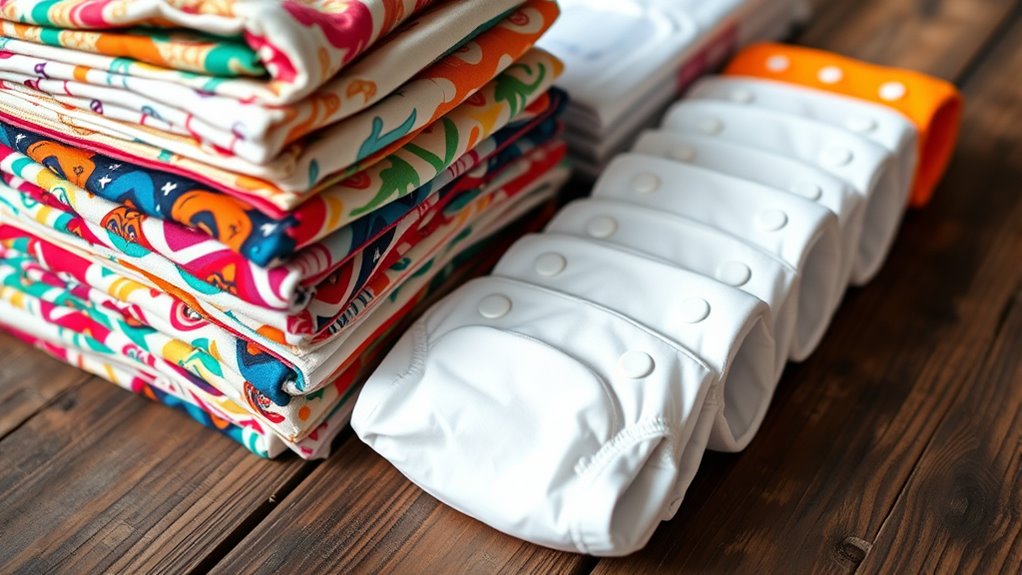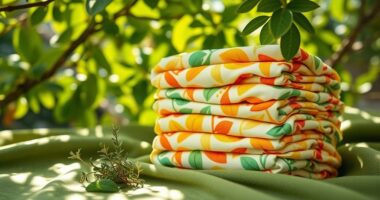When choosing between cloth and disposable diapers, consider your environmental values, budget, and daily routine. Cloth diapers are eco-friendly and cost-effective over time but require washing and maintenance. Disposables are more convenient and easier to use but create more waste and can be costly long-term. Think about what aligns best with your lifestyle and priorities—exploring these options further will help you find the right fit for your family.
Key Takeaways
- Consider environmental impact: cloth diapers are reusable and eco-friendly, while disposables generate long-lasting waste.
- Evaluate costs: cloth diapers have higher upfront costs but save money over time; disposables are cheaper initially but costly long-term.
- Assess lifestyle: cloth diapers require more laundry and planning, whereas disposables offer convenience and simplicity.
- Think about comfort: moisture-wicking fabrics in cloth diapers promote better baby comfort than some disposables.
- Align with values: choose based on your environmental priorities, budget, and willingness to manage laundry and maintenance.

Are you wondering whether cloth diapers or disposables are the better choice for your baby? Making this decision involves weighing several factors, but eco-friendliness and cost comparison are two of the most significant. Cloth diapers are often praised for their eco-friendly nature. Unlike disposables, which generate a substantial amount of waste that can take hundreds of years to decompose, cloth diapers are reusable. When you choose cloth, you’re reducing your household’s contribution to landfills and decreasing the environmental impact associated with manufacturing disposable diapers. Plus, many cloth diaper brands use sustainable materials, making them a greener option overall. However, it’s worth considering that cloth diapers require water and energy for washing, which also impacts the environment, though typically less than the continuous production and disposal of disposables. Additionally, modern cloth diapers often contain moisture-wicking fabrics that keep your baby comfortable and dry, further enhancing their appeal.
When it comes to cost comparison, cloth diapers might seem pricey upfront but often save you money in the long run. The initial investment in a good set of cloth diapers can range from a few hundred to over a thousand dollars, depending on quality and quantity. Still, because you can reuse them multiple times, these costs are spread out over months and years. In contrast, disposable diapers can cost hundreds of dollars per year per child. While the ongoing expenses of disposables are clear and predictable, they add up quickly, especially if your baby uses many diapers daily. If you plan to have more children, cloth diapers become even more economical, as you can pass them down or sell them later. On the other hand, some parents find the cost of cloth diapers intimidating, considering the need for additional accessories like inserts, diaper covers, and the costs associated with washing and drying.
In the end, your choice hinges on your values, lifestyle, and financial situation. Cloth diapers align with eco-conscious priorities and can be a budget-friendly option over time, but they demand more effort and planning. Disposables offer convenience and simplicity, with less initial investment, but come with ongoing costs and environmental concerns. Think about your daily routine, your willingness to handle laundry, and your environmental commitments. By understanding the eco friendliness and cost comparison aspects, you can make a decision that best fits your family’s needs and values, ensuring comfort for your baby and peace of mind for you.
Frequently Asked Questions
How Do Cloth and Disposable Diapers Compare in Environmental Impact?
Cloth diapers generally have a lower environmental impact since they’re reusable, reducing waste and biodegradability concerns. However, their manufacturing carbon footprint can be higher due to frequent washing and production processes. Disposable diapers, while convenient, create significant waste and raise biodegradability concerns because they take years to decompose. Ultimately, your choice depends on balancing environmental impacts, considering both manufacturing footprints and waste management.
Are Cloth Diapers Suitable for Overnight Use?
Yes, cloth diapers can be suitable for overnight use if you choose the right nighttime absorbency options. You might consider using extra inserts or thicker cloth diaper solutions designed specifically for overnight comfort and leak protection. make certain the diaper fits well to prevent leaks and keep your baby comfortable all night. With the right adjustments, cloth diapers can be practical for overnight wear, offering eco-friendly and cost-effective benefits.
What Are the Cost Differences Over the Baby’s Diapering Years?
You’ll find cloth diapers generally lead to significant cost savings over your baby’s diapering years, especially if you reuse them and buy in bulk. Although the initial investment is higher, long-term expenses are lower because you don’t keep buying disposables. Over time, cloth diapers help you save money, making them a more economical choice if you’re aiming to reduce ongoing expenses while being eco-friendly.
How Do Diaper Sizes and Fit Vary Between Options?
You’ll find that cloth diapers offer more size customization through adjustable snaps and elastic fit, allowing you to tailor the fit as your baby grows. Disposable diapers come in pre-set sizes, so they typically fit well initially but may require frequent size changes. To improve fit with cloth, use fit adjustment techniques like tightening snaps or using different inserts, ensuring comfort and preventing leaks.
Can Cloth Diapers Be Used With Different Diapering Accessories?
You can absolutely use cloth diapers with different diapering accessories. Many parents find that accessories like diaper covers, liners, and inserts enhance comfort and convenience. When packing your diaper bag essentials, include extra liners and wipes compatible with cloth diapers. Remember, washing cloth diapers requires specific care, so make sure you have a proper routine. This flexibility lets you customize your diapering system to suit your baby’s needs and your lifestyle.
Conclusion
Ultimately, choosing between cloth and disposable diapers is like selecting a vessel for your little one’s journey. Cloth diapers symbolize sustainability and mindful care, while disposables represent convenience and modernity. Whichever path you choose, remember it’s about nurturing your child and respecting your values. Your decision becomes a guiding star, illuminating your parenting voyage with purpose and love. Trust yourself—your choice is the vessel that best carries your family’s hopes and dreams.









